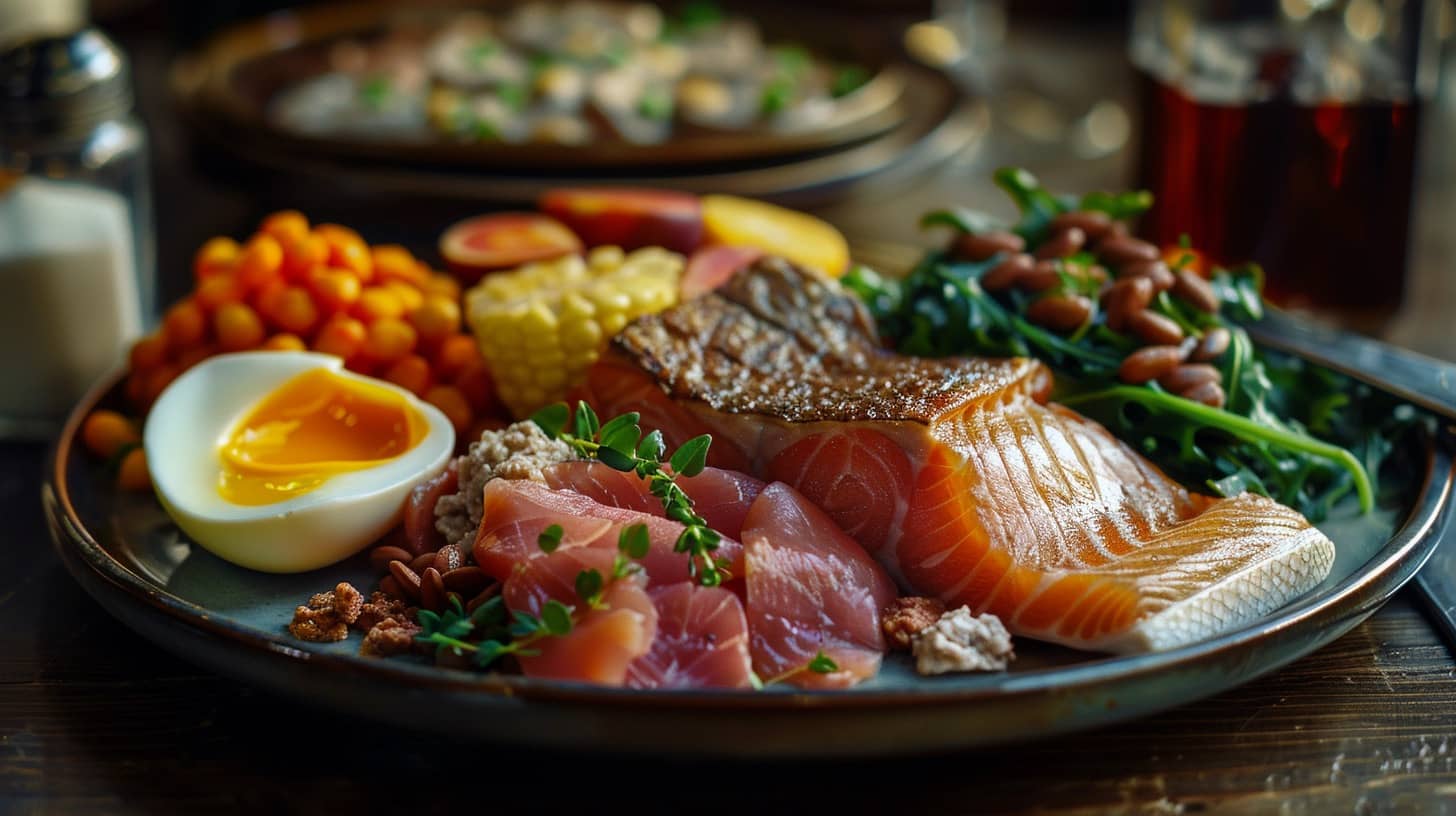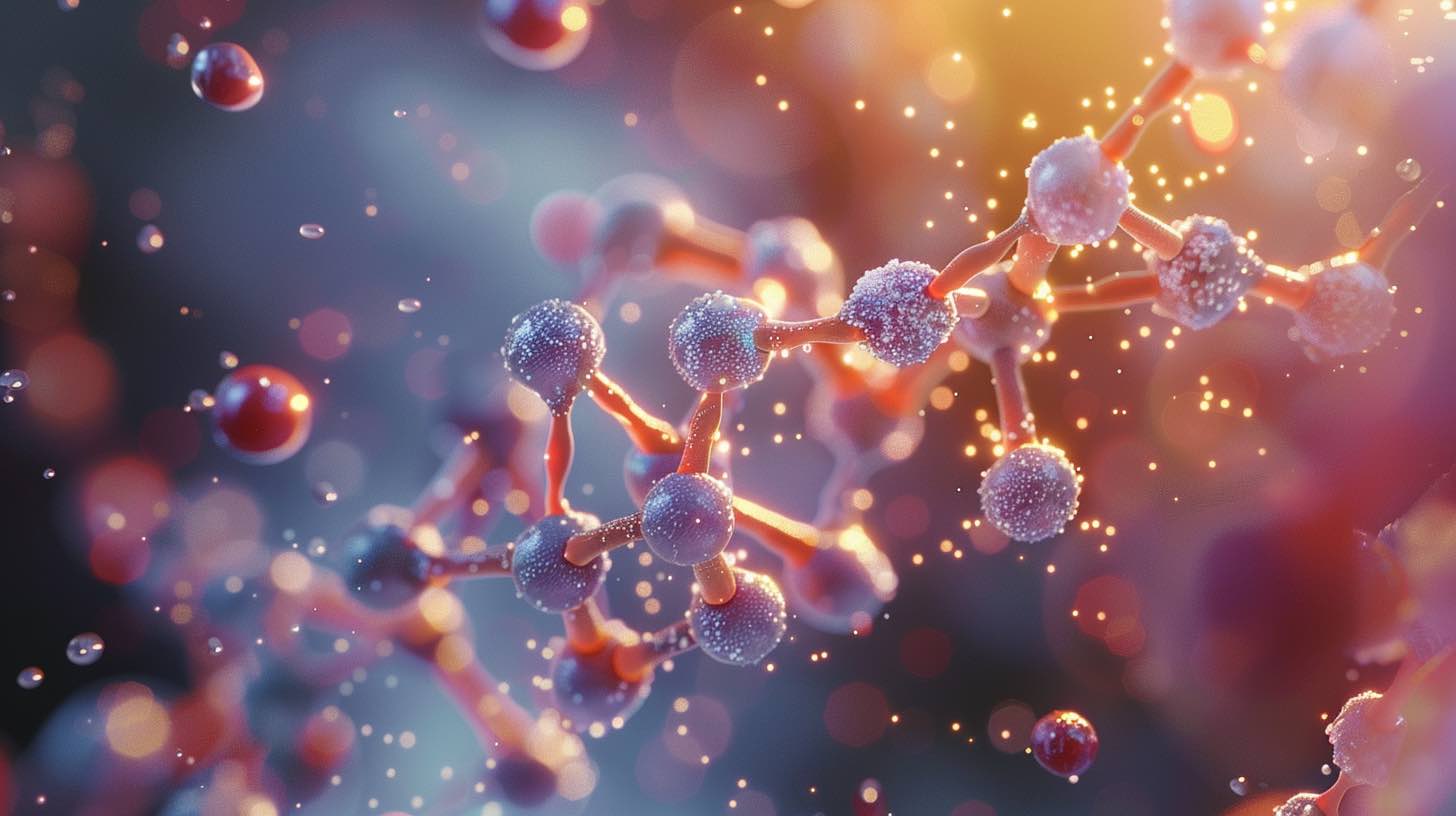June 10
Protein shakes don't make you a muscular beast.
Not even as a woman.
But they may prolong your life.
Sounds confusing?
Then let’s provide a better overview.
I. Introduction to proteins
Today we want to talk about one of the most important nutrients for our body: proteins.
If you're wondering what exactly proteins are and why they're so important, you've come to the right place.
So you're wondering what proteins are?
Well, simply put, proteins are large molecules made up of amino acids.
These amino acids are often referred to as the building blocks of life because they play a crucial role in various body functions.
From the repair of tissues and cells to Regulation of hormones and enzymes, proteins are involved in almost every process in our body.
The importance of proteins for our body cannot be overestimated.
They are vital for growth and development as well as for the maintenance and repair of tissues.
In addition, proteins also play an important role in a healthy immune system and good digestion.
Without enough protein in our diet, our body cannot function optimally.

II. The different types of proteins
We all know that protein is important for our health and fitness, but did you know that there are different types of protein?
Let's take a look at this.
2.1. Animal proteins
Animal proteins are probably the most commonly consumed type of protein.
These include sources such as chicken, beef, fish and eggs.
Animal proteins are considered complete proteins because they contain all nine essential amino acids that our body needs.
They are also rich in iron and vitamin B12that are important for general health.
2.2. Plant proteins
Plant proteins, on the other hand, come from plant sources such as beans, lentils, nuts and seeds.
While plant proteins alone are not always complete proteins, you can easily combine different plant sources to create a complete protein meal.
Plant proteins also contain less saturated fat and cholesterol than animal proteins, making them a good choice for those looking to reduce their consumption of animal products.
2.3. Supplements: Protein shakes and bars
Now let’s move on to dietary supplements.
Protein shakes and bars have become increasingly popular among fitness enthusiasts because they are a convenient way to increase their protein intake.
These supplements are typically made from whey or plant-based protein powders and offer a quick and easy way to increase protein intake on the go.
Protein shakes are great for post-workout recovery, while protein bars are a convenient on-the-go snack option.
Whether you prefer animal or plant-based proteins or consume protein shakes and bars, it is important that you consume enough protein to achieve your health and fitness goals.
Experiment with different protein sources and find out what works best for you!
In our Fitness Retreats we often use the protein from Mana.
Also take protein after Pilates at Templeshape
Try one of our trainings at a reduced price!
III. The role of proteins in nutrition
Let's talk about the role of the most popular macronutrient in the diet!
Protein is an important part of our diet because it plays a key role in various body functions, including muscle building, repair and growth.
In this section we learn how important protein is in your diet and how much you actually need.
3.1. Protein requirements: How much protein does the body need?
The amount of protein you consume in your diet depends on factors such as age, gender, activity level and general health.
In general, the recommended daily allowance (RDA) for protein is 0.8 grams per kilogram of body weight.
However, if you want to build muscle or are particularly active, you will need about twice as much protein to achieve your goals.
If you are physically active or want to build muscle, you should consume about 1.2-2.0 grams of protein per kilogram of body weight.
This higher intake can support muscle repair and growth, especially when combined with strength training.
3.2. Sources of protein in the diet
Now that we've discussed how much protein you need, let's talk about where you can find it in your diet.
There are many delicious and nutritious sources of protein, including animal sources such as meat, poultry, fish, eggs and dairy products.
Plant sources such as beans, lentils, tofu, Tempeh, nuts, seeds and whole grains provide plenty of protein.
It's important to vary your protein sources to ensure you get a wide range of essential amino acids - the building blocks of protein that our bodies need for various functions.
If you combine different protein sources throughout the day, you can meet your needs and ensure variety in the kitchen!
3.3. The importance of proteins for muscle building
Protein is often touted as an important nutrient for building muscle - and for good reason!
When we do weight training or other forms of resistance training, small tears are created in our muscles that need to be repaired and rebuilt stronger than before.
Protein plays a key role in this process as it provides the necessary amino acids for muscle repair and growth.
Adequate protein intake not only supports muscle building, but can also aid in weight management by promoting satiety and maintaining lean body mass during times of calorie restriction.
This means that getting enough protein can help you feel full and satisfied while also helping you achieve your fitness goals.
Whether you regularly go to Gym or simply want to provide your body with nutritious foods, make sure you eat plenty of protein-rich foods.

IV. Proteins for women
Protein is important for everyone, but did you know that women have slightly different protein needs than men?
Yes that is true!
Women need to make sure they consume enough protein to support their health and well-being.
Women's protein needs depend on various factors such as age, weight, activity level and general health.
On average, it is recommended that women consume about 46 grams of protein per day.
However, for pregnant or breastfeeding women, as well as for women who are very active or want to build muscle mass, this amount may increase.
When it comes to building muscle, protein plays just as important a role for women as it does for men.
Some women worry that too much protein will make them fat or too muscular, but the truth is that protein is essential for building and repairing muscle tissue.
Including protein-rich foods in your diet can help build muscle mass and aid recovery after exercise.
A high-protein diet for women should include a variety of sources such as lean meats like chicken, turkey and fish, as well as plant sources such as beans, lentils, nuts and tofu.
Dairy products such as yogurt and cheese are also a good source of protein.
It is important to maintain a balanced mix of animal and plant proteins to ensure you get all the essential amino acids your body needs.
In addition to wholesome protein sources, many women find it useful to meet their daily needs with protein powders or bars.
These products are handy when you're on the go or want something quick to eat after a workout.
Just make sure you choose high-quality products with few additives or sweeteners.
Overall, it is important for women's health and well-being to ensure they have an adequate protein intake.
Whether you want to build muscle, support an active lifestyle, or simply maintain your health, incorporating protein-rich foods into your daily meals can help you achieve your goals.
So enjoy the chicken salad or the parfait with Greek yogurt.

V. Protein-rich foods
Protein is an important nutrient for our body and plays a crucial role in building and repairing tissue, muscle growth and maintaining overall health.
Fortunately, there are many delicious and nutritious foods that are rich in protein.
5.1. Meat and fish as protein sources
Meat and fish are the classic sources of protein that many people rely on for their daily intake.
Whether you're a fan of juicy steaks, tender chicken breasts or flaky salmon fillets, there are plenty of ways to meet your protein needs.
In addition, these animal proteins usually contain other important nutrients such as iron, zinc and B vitamins.
5.2. Plant protein sources: legumes, nuts, seeds, etc.
If you're looking for something a little different or are vegetarian or vegan, there are also plenty of plant-based protein sources to choose from.
Legumes such as beans, lentils and chickpeas are not only rich in protein, but also in fiber and other important vitamins and minerals.
Nuts and seeds like almonds, chia seeds and pumpkin seeds are also a great option to add a protein boost to your meals or snacks.
5.3. Eggs: A versatile protein source
An often overlooked source of protein is eggs. Eggs are incredibly versatile - you can use them scrambled, fried, boiled, poached, baked...!
Eggs not only contain high-quality protein, but also important nutrients such as vitamin D and choline.
Whether you enjoy them as part of a hearty breakfast or as a main ingredient in your favorite baked goods, eggs are definitely worth adding to your diet.
We always order our eggs fresh from the farm at eiermeier.ch.
Overall, a high-protein diet doesn’t have to be boring or bland.
There are so many delicious options - whether meat and fish, legumes and nuts or the versatile eggs - that you can easily meet your protein needs while enjoying a variety of delicious meals.

VI. Protein shakes: benefits and use
Protein shakes have become a staple part of many people's diets, especially those looking to build muscle or recover from intense workouts.
They are a convenient and efficient way to ensure your body gets the protein it needs for muscle repair and growth.
But with so many choices on the market, how do you know which protein shake is right for you?
In this article, we explain the benefits of protein shakes, how to choose the right shake and how they can support muscle building and regeneration.
6.1. Why protein shakes?
Protein is an important macronutrient that plays a crucial role in building and repairing tissue in our body.
If we Sports like HIIT Bootcamp When we exercise, micro-tears develop in our muscles that need to be repaired in order to become stronger.
Protein shakes provide a quick and easy way to provide our muscles with high-quality protein so they can recover faster and grow more effectively.
Protein shakes are also a convenient option for those who don't have time to prepare a full meal after a workout or who need a quick snack on the go.
With just one scoop of protein powder and some water or milk, you can prepare a nutritious and filling shake in just a few minutes.
6.2. How to choose the right protein shake
When it comes to choosing the right protein shake for your needs, there are a few factors to consider.
First and foremost, you should choose a high-quality protein powder that is free from added sugar or artificial ingredients.
Whey protein is one of the most popular options because it is quickly absorbed by the body and contains all the essential amino acids needed to build muscle.
If you are lactose intolerant or prefer a plant-based option, there are also many vegan protein powders made from sources such as pea, soy or rice protein.
These options also provide all the essential amino acids your body needs to build muscle.
It is also important to pay attention to the taste and consistency of the protein shake.
Some people prefer sweeter flavors like chocolate or vanilla, while others may prefer something neutral that they can enhance with fruit or nut butter.
Experiment with different brands and flavors until you find one that you enjoy drinking regularly.
6.3. Protein shakes for muscle building and regeneration
Protein shakes, when combined with regular strength training, can be an effective way to build muscle mass.
Consuming a high-protein shake after a workout can stimulate protein synthesis in the muscles, leading to faster recovery and growth.
If you want to maximize your muscle building potential, you should consume a protein shake within 30 minutes of your workout.
This post-workout window is when your muscles are most receptive to nutrients like protein, making it an ideal time to drink a shake.
Protein shakes not only help build muscle, but also help muscles regenerate after intense physical activity.
The amino acids contained in protein powders play an important role in repairing damaged muscle fibers and reducing muscle soreness after training.
Overall, incorporating protein shakes into your diet can be an effective way to support your fitness goals and promote your overall health.
Whether you're looking to build muscle mass or recover from tough workouts, there's a protein shake out there that's perfect for you.
So grab your blender and start experimenting with different flavors and brands.

VII. Protein and longevity
Protein is often considered the building block of life and plays a crucial role in our health and well-being.
As we age, the importance of protein becomes even more apparent, as it can help us maintain muscle mass, improve bone health and maintain a strong immune system to support.
In fact, research has shown that protein can also play a key role in promoting longevity.
7.1. The role of proteins in longevity
Proteins are important for the repair and maintenance of our cells, tissues and organs.
They are also involved in various metabolic processes that help our body function properly.
The older we get, the more proteins our body needs to support these processes and prevent muscle loss.
Studies have shown that older adults who consume adequate amounts of protein have better muscle mass and strength and are at a lower risk of developing chronic diseases.
7.2. Protein and muscle health in old age
One of the biggest problems for older adults is maintaining muscle mass and strength.
As we age, our bodies naturally lose muscle mass, which can lead to frailty and an increased risk of falls and fractures.
Protein plays a crucial role in maintaining muscle mass and strength, especially when combined with regular exercise.
By consuming adequate protein from sources such as lean meat, poultry, fish, eggs, dairy products, legumes, nuts and seeds, older adults can support their muscle health and overall physical function.
7.3. Tips for optimizing protein intake in old age
There are several ways older adults can optimize their protein intake to support their overall health and longevity.
An important tip is to eat protein-rich foods at every meal and snack throughout the day.
This way you can ensure that your body is constantly supplied with amino acids that support muscle repair and growth.
It is also important to choose high-quality protein sources that are low in saturated fats and added sugars.
Another tip is to spread your protein intake evenly throughout the day rather than burdening yourself with one large meal.
This way you can maximize muscle protein synthesis throughout the day and prevent muscle loss.
Additionally, older adults should look for a variety of protein sources to ensure they get all the essential amino acids their bodies need.
In summary, protein plays an important role in promoting longevity by supporting muscle health, bone density, immune function and overall well-being.
By incorporating high-quality protein sources into your diet and following these tips for optimal intake as you age, you can support your body's natural aging process and enjoy better health outcomes as you get older.

VIII. Practical tips for starting a protein-rich diet
So you have decided to follow a high-protein diet - congratulations!
Whether you want to build muscle, lose weight, or simply improve your health, increasing your protein intake can have many benefits.
But where should you even start?
Don't worry, I have practical tips for you to help you get started.
8.1. How to calculate your protein needs
First, we need to find out how much protein you actually need.
The general recommendation for protein intake is 0.8 grams per kilogram of body weight.
However, if you want to build muscle or engage in intense physical activity, you may need more.
To calculate your specific protein needs, simply multiply your body weight in kilograms by a factor that corresponds to your activity level:
- Sedentary: 0.8-1.0 grams/kg
- Moderate activity: 1-1.5 grams/kg
- Intense activity or muscle building: 1.5-2+ grams/kg
Once you have this number, you can easily plan how much protein you should include in each meal and snack throughout the day.
8.2. Planning protein-rich meals and snacks
Now that you know how much protein you need, it's time to incorporate it into your meals and snacks.
The most important thing is that you use a variety of protein sources such as lean meat, poultry, fish, eggs, dairy products, legumes, nuts, seeds and tofu.
Start by planning your meals around a protein source - for example, grilled chicken breast for lunch or Greek yogurt with berries for breakfast.
Don’t forget your snacks!
If you feel hungry between meals, opt for a handful of almonds or a hard-boiled egg.
A look into our cookbook "Nourish from Within" will help you find something suitable.
8.3. Frequently asked questions about protein nutrition answered
Are you still a little confused when it comes to protein?
We will answer a few questions that may still be on your mind:
- Can I get enough protein from plant sources?
Absolutely! Legumes like beans and lentils are great sources of plant-based protein.
- Can you eat too much protein?
Yes, you can overdo it with protein, which can put excessive strain on the kidneys.
- Should I have a protein shake after training?
Whole foods are generally better than supplements to meet your daily protein needs.
If you follow these practical tips and guidelines for starting a high-protein diet, you'll be well on your way to achieving your health and fitness goals.
Remember to listen to your body and make adjustments if necessary.
And now have fun with all the delicious protein-rich meals!
tags

